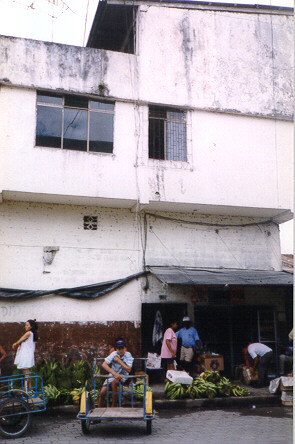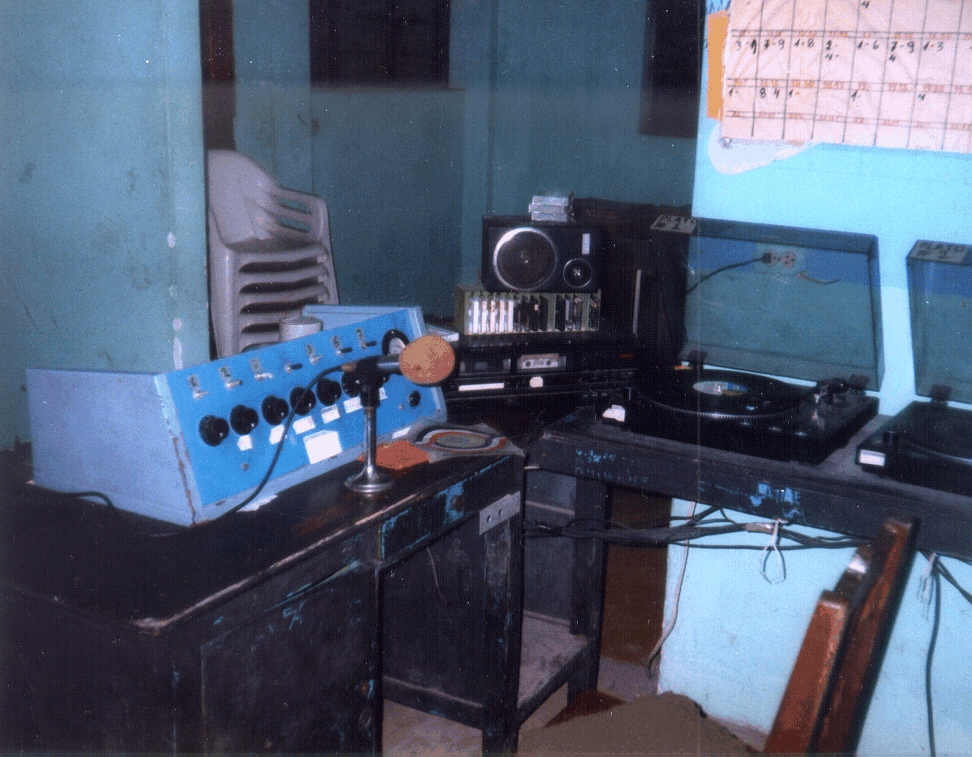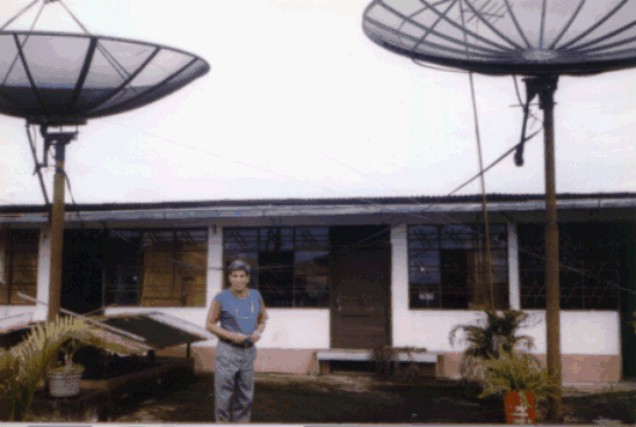

|
- | Our bus pulled into Coca,
a jungle town with no paved roads, at 5 AM. Coca is the home of Radio Cumandá,
a station that once was on SW, and what a weird feeling I had hearing its
sign-on from a street vendor’s boombox! Elsa and I stood by the side of
the road for almost an hour waiting for a big bus, but the only thing to
pass were chivas – pick-up trucks with four rows of benches used as public
transportation in the Amazon. "Come on," I insisted, "Let's get on
one!" Elsa wasn't too keen on the idea, being a urban lady of the
Nineties. But as chiva after chiva zoomed by screaming "Lago, Lago,
Lago!" she finally caved in. And so we climbed onto the back of one
not knowing that a lovely and bumpy 4-hour ride was waiting for us...
 Lago
Agrio didn’t even exist twenty years ago, but after oil was discovered
a boomtown was born. It’s a hot, humid, and bustling town with a population
of hustlers and aggressive Colombians. In fact, walking around in Lago
Agrio felt more like traveling in Indonesia than in Ecuador! People try
to hawk everything from watches to tiny pet monkeys on the street, but
since most people are there to make money I doubt much is really ever sold.
Only two streets have running water, and luckily for us, one office with
service is Ecos del Oriente – where we were able to refreshen ourselves
once again. At least Elsa was smart enough to... Lago
Agrio didn’t even exist twenty years ago, but after oil was discovered
a boomtown was born. It’s a hot, humid, and bustling town with a population
of hustlers and aggressive Colombians. In fact, walking around in Lago
Agrio felt more like traveling in Indonesia than in Ecuador! People try
to hawk everything from watches to tiny pet monkeys on the street, but
since most people are there to make money I doubt much is really ever sold.
Only two streets have running water, and luckily for us, one office with
service is Ecos del Oriente – where we were able to refreshen ourselves
once again. At least Elsa was smart enough to...
Mr. Velástegui brought us up to his office and explained that Ecos del Oriente, once a rare catch on 3270 kHz, left SW in 1995. “It didn’t make any money,” he sighed. SW transmitters, he says, cost about 15 million sucres (US$3000) a month to power, whereas FM transmitters cost 9 million sucres (US$1800) and pull in more advertisers. “Do the math. It just wasn’t a feasible service to maintain.”  Ecos
del Oriente remains on 1510 kHz MW, however, and is part of the Grupo Radial
Continental network, which includes two television stations, two MW outlets
and 6 FM stations. “This is Ecos del Oriente,” he joked as we walked into
the studio: a single mixer, two turntables, a tape deck, and a wall of
LP’s. On the roof of the building, however, are signs of more prosperity.
Mr. Velástegui proudly showed us his company’s two satellite dishes
that are used to capture various television programs. "Oil is what
moves this town," he said as he pointed to massive refineries looming on
the horizon. Ecos
del Oriente remains on 1510 kHz MW, however, and is part of the Grupo Radial
Continental network, which includes two television stations, two MW outlets
and 6 FM stations. “This is Ecos del Oriente,” he joked as we walked into
the studio: a single mixer, two turntables, a tape deck, and a wall of
LP’s. On the roof of the building, however, are signs of more prosperity.
Mr. Velástegui proudly showed us his company’s two satellite dishes
that are used to capture various television programs. "Oil is what
moves this town," he said as he pointed to massive refineries looming on
the horizon.
 We
went back down to his office and he offered to type up a quick verification
letter for a reception I had of Ecos del Oriente somce years ago.
Elsa looked at her watch and whispered into my ear "We've got an hour,
Nicolás, there's no time to see the antenna!" I took it as
the clue that it was... We
went back down to his office and he offered to type up a quick verification
letter for a reception I had of Ecos del Oriente somce years ago.
Elsa looked at her watch and whispered into my ear "We've got an hour,
Nicolás, there's no time to see the antenna!" I took it as
the clue that it was...
Before the two of us left, Luis urged us to try Ceviche de Boa, a local delicacy of Lago Agrio. And so we indeed ordered the dish later that morning and can now say that snake does taste like chicken. Unfortunately, it also gave me an horrible case of gastrointestinal problems! With little time to spare, we bounced from cafe to cafe looking in vain for a bathroom with running water. (Toilet paper is uncommon in Indonesia, so I can easily make do with water and my left-hand - however, as I quickly realized... Water is uncommon in Lago Agrio, a city named "Bitter Lake" in Spanish.) Well, we finally did make it back to Quito after our marathon through Ecuador's interior. As exhausting as the excursion was, getting to know the radio stations and the people behind the microphones was well worth the effort. What is certain is the coming decline of short wave in this country - unless, of course, the Church has anything to do with it! |